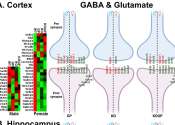New insights into cholesterol dynamics shed light on neurodegenerative disease
Usually, the word "cholesterol" prompts a negative reaction because of its role in cardiovascular disease. While this is true, cholesterol is also vital for cells to function correctly—for example, cholesterol is a component ...
Apr 9, 2024
0
56









